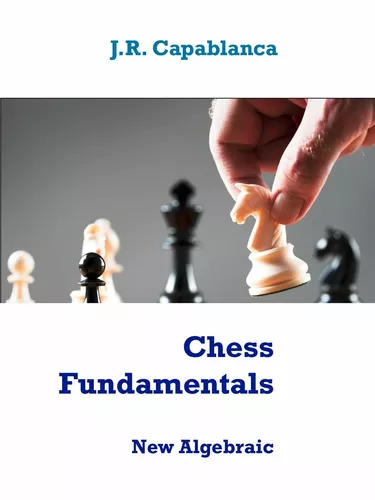
Chess Fundamentals
Algebraic edition
R.J.J. Eskola (Ed.)Vapaa-aika, harrastukset & kulttuuri
ePUB
11,2 MB
DRM: Vesileimaus
ISBN-13: 9789523301894
Kustantaja: Books on Demand
Julkaistu: 08.12.2015
Kieli: englanti
Esteettömyys: Rajoitettu pääsy
sis. alv.
Heti ladattavissa

R.J.J. Eskola (Ed.)
José Raúl Capablanca y Graupera (19 November 1888 – 8 March 1942) was a Cuban chess player who was world chess champion from 1921 to 1927. Considered one of the greatest players of all time, he was renowned for his exceptional endgame skill and speed of play. He was exceptionally difficult to beat, losing only 35 first class games in his entire career.
Born in Havana, he beat Cuban champion Juan Corzo in a match at the age of 13 years. His defeat of Frank Marshall in a match in 1909 earned him an invitation to the 1911 San Sebastian tournament, which he won ahead of players such as Akiba Rubinstein, Aron Nimzowitsch and Siegbert Tarrasch. After several unsuccessful attempts to arrange a match with the then world champion Emanuel Lasker, during which he had a strong series of tournament results, he finally won the title from Lasker in 1921. Capablanca was undefeated from February 10, 1916 to March 21, 1924, which included the world championship match with Lasker.
Capablanca lost the title in 1927 to Alexander Alekhine, who had never beaten Capablanca before the match. After unsuccessful attempts to arrange a return match over many years, relations between them became bitter. Capablanca continued his excellent tournament results in this period but withdrew from serious chess in 1931. He made a comeback in 1934, with some good results, but also showed symptoms of high blood pressure. He died in 1942 of "a cerebral hemorrhage provoked by hypertension".
Capablanca excelled in simple positions and endgames; Bobby Fischer described him as possessing a "real light touch". He could play tactical chess when necessary, and had good defensive technique. He wrote several chess books during his career, of which Chess Fundamentals was regarded by Mikhail Botvinnik as the best chess book ever written. Capablanca preferred to not present detailed analysis but focused on critical moments in a game. His style of chess was influential in the play of future world champions Bobby Fischer and Anatoly Karpov.





Kirjasta ei ole ilmestynyt lehdistöarvosteluja.